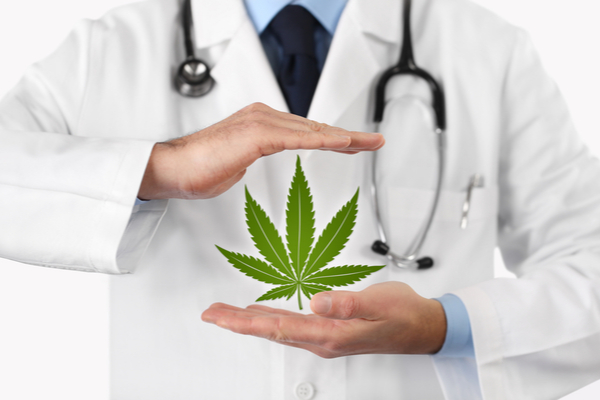Last week, the Biden administration moved to downgrade marijuana from its current Schedule 1 to a lower risk, Schedule 3, a historic move that acknowledges the medical benefits of the long-criminalized drug and carries broad implications for cannabis-related research and the industry at large.
As CNN reports, the US Department of Justice (DOJ) recommended that marijuana be rescheduled as a Schedule III controlled substance, a classification shared by prescription drugs such as ketamine and Tylenol with codeine. “Today, [Attorney General Merrick Garland] circulated a proposal to reclassify marijuana from Schedule I to Schedule III,” Xochitl Hinojosa, the DOJ’s director of public affairs, said in a statement. “Once published by the Federal Register, it will initiate a formal rulemaking process as prescribed by Congress in the Controlled Substances Act.”
The formal rulemaking process is lengthy, typically includes a public comment period and could take months to complete.
Times Have Changed
For decades, marijuana was deemed highly dangerous, addictive and wasn’t seen as having any medicinal value, but as time has moved on so have the views on pot. Marijuana has been classified as a Schedule 1 drug since the inception of the Controlled Substances Act of 1970.
The reclassification, first reported by the Associated Press, could potentially have marijuana going from having the same criminal statutes as drugs like heroin and LSD, to being on par with drugs that have medical applications like some acetaminophen-codeine combinations.
The change still doesn’t make marijuana completely legal though. Here’s a look of what it means for drugs to be classified as schedule III.
What is a Schedule III Drug?
Schedule 3 drugs are controlled substances, but these types of drugs are subject to various rules that allow for some medical uses. The rules also outline the federal criminal prosecution of anyone who traffics in the drugs without permission. Schedule 3 drugs include things like, ketamine, anabolic steroids and some acetaminophen-codeine combinations.
Marijuana is currently designated a Schedule I drug which is believed to be “highly dangerous, addictive and not for medical use.” The reclassification would move it from this category to a Schedule III drug that can be lawfully prescribed as medication.
What kinds of Drugs are on the Schedule III list?
Schedule III drugs are narcotics classified by the federal government. Here are some examples of Schedule III drugs:
- Products containing less than 90 milligrams of codeine per dosage unit (Tylenol with codeine)
- ketamine
- anabolic steroids
- testosterone
Accepted for Medical Use
Last fall, members of the FDA’s Controlled Substance Staff wrote in the documents that the agency recommended rescheduling marijuana because it meets three criteria: a lower potential for abuse than other substances on Schedules I and II; a currently accepted medical use in treatment in the US; and a risk of low or moderate physical dependence in people who abuse it. The National Institute on Drug Abuse concurred with the recommendation.
Although marijuana has a “high prevalence of non-medical use” in the US, it doesn’t seem to elicit serious outcomes, compared with drugs such as heroin, oxycodone and cocaine, the researchers said. “This is especially notable given the availability” of products that contain very high levels of Delta 9 tetrahydrocannabinol (THC), the primary active compound in cannabis.
Does not Resolve the Federal-State Conflict
Moving marijuana out of Schedule I could open more avenues for research; ease some of the more harshly punitive criminal consequences; potentially allow cannabis businesses to bank more freely and openly; and, perhaps most significantly for state-licensed operators, result in firms no longer being subjected to a 40-year-old tax code that disallows credits and deductions from income generated by sales of Schedule I and II substances.
However, rescheduling marijuana will not solve that federal-state conflict, the Congressional Research Service (CRS) noted in a January 16 brief. The manufacture, distribution and possession of recreational marijuana would remain illegal under federal law and possibly subject to enforcement and prosecution regardless of the state’s legality, the CRS wrote.
“Outside of the tax implications, this is monumentally symbolic,” Andrew Freedman, the former Colorado cannabis czar who now serves as executive director of the Coalition for Cannabis Policy, Education and Regulation, told CNN in an interview. “It is rare for the federal government to reverse itself on an issue where it’s had a stance for the last 100 years and arrested countless people for.”
States with medical marijuana programs do currently have some federal protections in place via appropriations legislation that restricts the Justice Department from interfering in those programs. Schedule III status will not affect that rider, the CRS said.
The 2018 Agriculture Improvement Act, better known as the Farm Bill, defined and decontrolled hemp and hemp-derived cannabidiol and removed it from the definition of marijuana — and from regulatory control — under the Controlled Substances Act. The FDA’s scientific and medical evaluation of marijuana did not address products containing plant-derived cannabidiol, commonly known as CBD.
—
Photo Credit: visivastudio / Shutterstock.com
